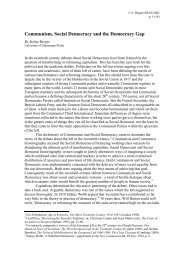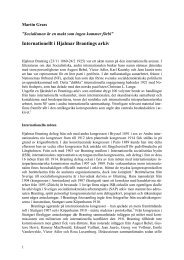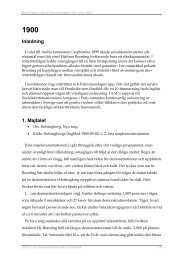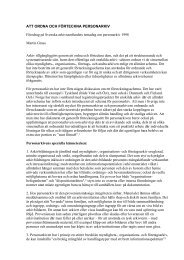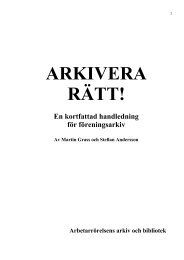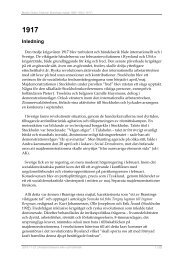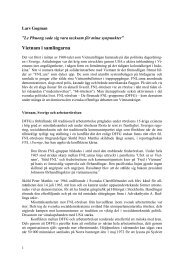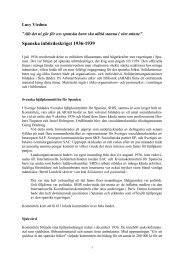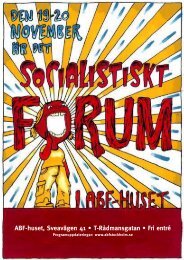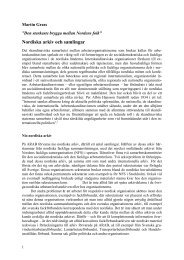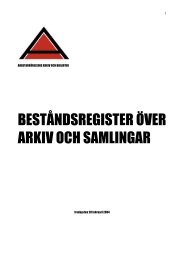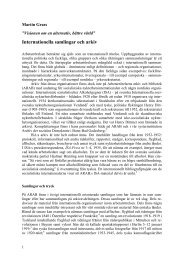Christine Collette
Christine Collette
Christine Collette
- No tags were found...
Create successful ePaper yourself
Turn your PDF publications into a flip-book with our unique Google optimized e-Paper software.
© C. <strong>Collette</strong>/ARAB 2002p. 6 (9)plained of non-payment of fees; substantial payments had been made only by the Germansand Belgians, Austria had paid half its fees. 33 In 1905, several French resolutions to improvethe functioning of the Bureau resulted in the appointment of Camille Huysmans (formerlysecretary to the Interparliamentary Commission) as Secretary. It was not until 1907 that statutesand rules of procedure were drawn up and authority given for the Bureau to act as thevoice of the International between Congresses.While Huysmans’s long career gave exemplary testimony to his worth, contemporarycriticisms of Serwy, rather than being reflections on his capability, can be read as part of thegrowing pains of national party formation in the various countries. In these circumstances, theBureau’s task of attempt to consolidate socialist representation within each country was extremelydifficult. The 1904 Congress resolved that, as, in each country, there was one proletariat,so there should be one socialist party. Each national party was intended to delegate tworepresentatives. Correspondence between British parties and the Bureau illustrates the difficultiesSerwy faced. In Britain there was a nation state, but, as indicated above, more than oneparty. Hyndman insisted that he and Quelch, both of the SDF, had been elected at the 1900Paris Congress as national representatives by all British parties. The ILP, however, claimedone of these two places, appointing Keir Hardie as delegate. This dispute, with increasinglyangry correspondence from Hyndman, who had the tactical advantage of writing French, wasnot settled until after the 1904 Amsterdam Congress. Hyndman objected to Hardie’s signatureon Bureau manifestos, even when agreeing their content and made difficulties about dates formeetings. An example of Hyndman’s style was his July 1902 accusation that the International’s‘opportunities (were) utterly frittered away’. ‘Surely the local self-style’d “ExecutiveCommittee” cannot be under the hallucination that it preserves all the knowledge of the Universe?Or is that what is really the matter with Vandervelde?’ Meanwhile, apart from onepayment of £4 by the ILP, neither party paid its fees. By 1904 the Socialist Labour Party ofGreat Britain, denounced by Hyndman as ‘impossibilists’, many of whom had been excludedfrom the SDF, was also asking to be invited to congresses, while the ILP was proffering theimportance of the Fabian Society. The Labour Representation Committee nominated threedelegates for the 1904 Congress. Serwy’s letters remained polite; he accepted the ILP £4, includedHardie’s name on delegates’ lists and made great efforts to resolve all this, trying toget the SDF and ILP to meet – neither would take the first step – and journeying to Britainwith other Bureau officers to arbitrate a meeting. Following the discussions on socialist unityat the 1904 Congress, the British waited until the end of 1905 to form their own British NationalCommittee to deal with all business relating to the International and this appointedHyndman and Hardie as delegates. The ILP, however, refused to pay back- fees. ILP leadingfigures Philip Snowden and Francis Johnson wrote to Serwy: ‘No proposal for the completefusion of all or any of the Socialist bodies which would involve submergence of their existingnames, policies or formulae would at present be entertained by any of the sections’. Theyfurther insisted on comprehension of the working of the Labour Representation Committee:‘… in our relations as socialists with the Trades Unionists in the new Labour RepresentationMovement … formed to bring together the trades unions, Cooperators and socialists’. In theirview, it was not necessary that this new agency profess socialism; its function was to ensure aviable electoral alternative to capitalist party candidates and the formation of a Labour Partywould be the next step. 3433 Haupt (1969) pp. 24/5, document 1, circular on ISB constitution and cited, p.58, comment on difficulties.Serwy’s comment, Camille Huysman Archive 1 November 1901, I 316/2.34 Camille Huysman Archive: on delegates, Hyndman to Serwy 5 December 1900 I 100/2, Penny (ILP) to Serwy14 November 1900 I 100/14, Ramsay MacDonald (LRC) to Serwy 2 July 1904 I 100/17, Neil Maclean (SLPGB)to Serwy n.d. I 100/106; Hyndman’s complaints to Serwy, 16 September 1901, 27 December 1901, I 100/40 I100/38, cited, 22 July 1902, I 100/62 ; ILP/SDF refusals to meet, Penny to Serwy 13 June 901 I 100/18, Quelch



